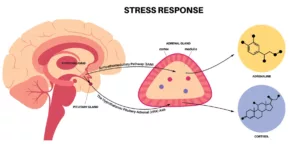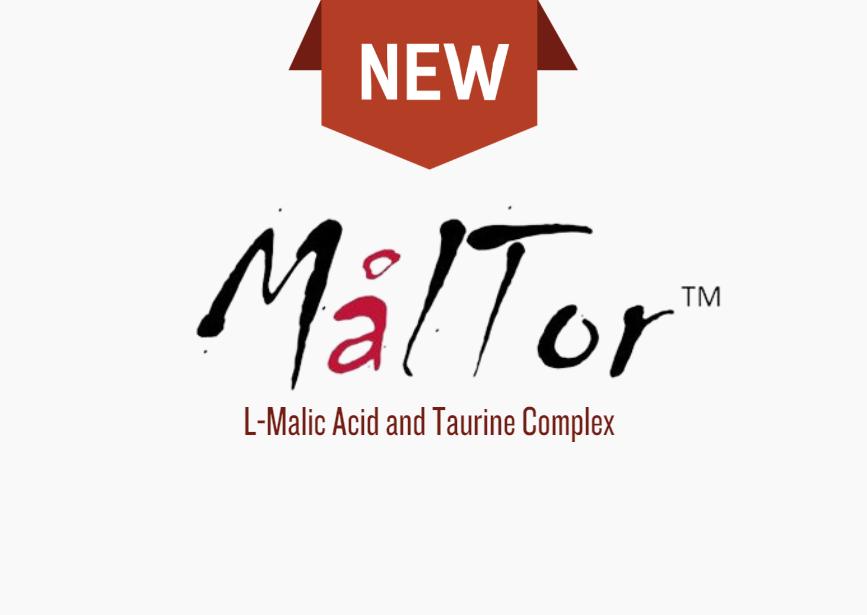In today’s busy world, stress affects us in both conscious and subconscious ways. We can recognize signs of stress as changes in our thoughts, feelings and behaviors, together with physical effects such as fatigue or pain. These are some of the overt symptoms of stress. However, to address stress more effectively we need to better understand the effects of stress on the biological systems of our bodies. In a nutshell, these effects include changes to the central nervous system (memory and cognitive learning), the immune system, the cardiovascular system, the gastrointestinal system (appetite modification, GI tract movement, digestive function, and GI system inflammation), and the endocrine system. Across all of these systems, there is a common thread to pay attention to – cortisol.
Cortisol is the body’s main stress hormone, and is produced in the adrenal glands. The hypothalamus and the pituitary glands – both in the brain – mediate the amount of cortisol produced by tracking the blood cortisol levels. Cortisol receptors are present in most cells in the body, and these receptors receive and use cortisol in different ways. This is the primary mechanism for how stress is translated into biological activity.

By now, we all know that our pets also are affected by stress. Any source of anxiety or fear can lead to stress – especially pronounced in dogs. Stress causes adaptive changes in pets, including increased energy diversion to the muscles, increased heart rate and blood pressure, and suppression of digestion. Cortisol is also the main stress hormone produced in mammals and some other animals. However, pets (particularly dogs), can have highly emotional reactions to stress. Biological responses involve serotonin, noradrenaline, dopamine and GABA, which are all involved in the development of fear and anxiety.
As we look to natural products to help reduce stress in both us and our pets, the best ingredients are those which are based on thousands of years of traditional use and backed by modern clinical studies. There are two basic types of studies: those which involve questionnaires, and those which involve measurement. Many good clinical studies will combine both types. Questionnaire studies are suitable for humans – for pets, this is usually translated into an observation of behaviors. Measurement studies include measurement of morning saliva cortisol (for humans) or measuring hair cortisol (for dogs).
Natural Ingredients for Managing Stress
L-Theanine
L-theanine occurs naturally in tea; it is the key component of tea that imparts a sense of relaxation. For centuries, it’s been revered for its ability to boost brain function and promote a relaxed, yet alert state. L-theanine is an amino acid that affects the Gabagenic system and is effective for acute relief of stress. Suntheanine® is an example of an L-theanine that has been extensively studied for its stress and anxiety reduction properties – in both humans and animals.
Magnesium
Magnesium plays a crucial role in countless enzymatic reactions throughout the body, including those involved in the regulation of cortisol. Research indicates that adequate magnesium levels may help to promote relaxation, reduce feelings of anxiousness, and improve sleep. Magnesium blocks the activity of overly-stimulating neurotransmitters and binds to calming receptors. Magnesium works best in combination with other ingredients, and in increased bioavailable forms like Magnesium Glycerophosphate (NutriGP® Mg).
Rhodiola
Rhodiola, a herb known for its calming properties, has been used for centuries to help alleviate stress. Found in high-altitude regions of Europe and Asia, this adaptogenic plant is known for its ability to enhance resilience to mental and physical stressors. Rhodiola helps to regulate stress hormones like cortisol, helping to balance mood and promote relaxation. Rhodiola has been extensively studied and is considered safe for most individuals and has long been recommended by holistic veterinarians.
Cordyceps
Cordyceps (NutriCelium® Cordyceps), a unique fungus known for its adaptogenic properties, it has gained popularity for its potential to reduce stress and enhance overall well-being in both people and pets. As an adaptogen, cordyceps is believed to help the body adapt to stressors, promoting a sense of calm and balance. For pets, cordyceps may offer similar benefits, but research on its safety and efficacy in animals is limited.
____________________________________________________________________________________
Given the availability of “star power” clinically-researched ingredients for stress in humans and pets (ashwagandha, L-theanine, magnesium, and a variety of others), there is significant flexibility in formulating stress-reducing consumer and pet products. These types of clinically researched products are sought after by consumers, both for themselves and their pets to help reduce stress and anxiety behavior. As consumers have become increasingly aware of the quality and effectiveness of the ingredients that they consume, they are also prioritizing the same when it comes to products for their animals. Savvy brands are responding to this growing trend by offering the same high-quality ingredients for stress and anxiety in product lines for both people and pets.
____________________________________________________________________________________
NutriScience Innovations develops and markets innovative ingredients for the dietary supplement and functional food markets. NutriScience’s ingredients are used in supplements offered by many well recognized and consumer trusted brands. NutriScience offers many ingredients for pet and human health and wellness. For more information on our company and our ingredients, contact us at [email protected].










